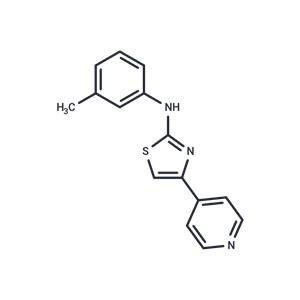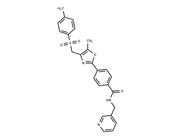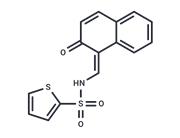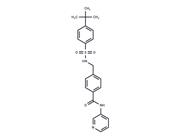| Name | STF-62247 |
| Description | STF-62247 is TGN inhibitor with IC50 of 0.625 μM and 16 μM in RCC4 and RCC4/VHL cells, respectively. |
| Cell Research | For cell viability, 100,000 cells are plated in a 12-well plate. The following day, 1.25 μM STF-62247 is added in the presence or absence of 1 mM 3-MA for 24 hours at 37 °C. Cells are trypsinized and counted by trypan blue exclusion. For XTT assays, 5000 RCC4 with and without VHL cells or 2,500 SN12C with and without VHL shRNA cells are plated in 96-well plates. The following day, vehicle (DMSO), STF-62247 is added to media by serial dilution. Four days later, the media is aspirated and XTT solution containing 0.3 mg/ml of XTT in Phenol Red-free media, 20% FCS and 2.65 mg/ml N-methyl dibenzopyrazine methyl sulfate (PMS) is added to the cells and incubated at 37 °C for 1-2 hours. Metabolism of XTT is quantified by measuring the absorbance at 450 nm on a plate reader. (Only for Reference) |
| Kinase Assay | SIRT1 fluorescence polarization assay and HTS: In the SIRT1 FP assay, SIRT1 activity is monitored using a 20 amino acid peptide (Ac-Glu-Glu-Lys(biotin)-Gly-Gln-Ser-Thr-Ser-Ser-His-Ser-Lys(Ac)-Nle-Ser-Thr-Glu-Gly–Lys(MR121 or Tamra)-Glu-Glu-NH2 ) derived from the sequence of p53. The peptide is N-terminally linked to biotin and C-terminally modified with a fluorescent tag. The reaction for monitoring enzyme activity is a coupled enzyme assay where the first reaction is the deacetylation reaction catalyzed by SIRT1 and the second reaction is cleavage by trypsin at the newly exposed lysine residue. The reaction is stopped and streptavidin is added in order to accentuate the mass differences between substrate and product. The fluorescence polarization reaction conditions are as follows: 0.5 μM peptide substrate, 150 μM βNAD +, 0-10 nM SIRT1, 25 mM Tris-acetate pH 8, 137 mM Na-Ac, 2.7 mM K-Ac, 1 mM Mg-Ac, 0.05% Tween-20, 0.1% Pluronic F127, 10 mM CaCl 2 , 5 mM DTT, 0.025% BSA, and 0.15 mM nicotinamide. The reaction is incubated at 37°C and stopped by addition of nicotinamide, and trypsin is added to cleave the deacetylated substrate. This reaction is incubated at 37 ℃ in the presence of 1 μM streptavidin. Fluorescent polarization is determined at excitation (650 nm) and emission (680 nm) wavelengths. |
| In vitro | In vitro, STF-62247 shows cytotoxicity and tumor growth inhibitory activity against wild-type VHL and VHL-deficient renal cell carcinoma (RCC) in a HIF-independent manner with IC50 of 16 μM and 0.625 μM, respectively. Moreover, STF-62247 also leads to cell death by increasing acidification and inducing autophagy in VHL-deficient cells. [1] STF-62247 specifically induces macroautophagy and enhances the fusion of autophagosome and lysosomes to form autolysosomes by interfering with Golgi-endoplasmic reticulum transport in cells that have lost VHL . [2] A recent study shows that induction of autophagy by STF-62247 increases sensitivity of RCC under hypoxic conditions to radiation in a VHL-dependent manner. [3] |
| In vivo | In vivo mouse model, STF-62247 at a dose of 8 mg/kg by intraperitoneal injection significantly reduces tumor growth of VHL-deficient SN12C tumor cells. [1] |
| Storage | Powder: -20°C for 3 years | In solvent: -80°C for 1 year | Shipping with blue ice. |
| Solubility Information | DMSO : 55 mg/mL (205.72 mM), Sonication is recommended.
H2O : < 1 mg/mL (insoluble or slightly soluble)
Ethanol : 3 mg/mL (11.22 mM)
|
| Keywords | renal | VHL | carcinoma | inhibit | cytotoxic | cell | RCC | Inhibitor | STF62247 | intracytoplasmic | vacuoles | STF-62247 | Autophagy |
| Inhibitors Related | Stavudine | Xylitol | Myricetin | Sodium 4-phenylbutyrate | Hydroxychloroquine | Guanidine hydrochloride | Taurine | Curcumin | Oxyresveratrol | Paeonol | Naringin | Gefitinib |
| Related Compound Libraries | Bioactive Compound Library | Autophagy Compound Library | Inhibitor Library | NO PAINS Compound Library | Endocrinology-Hormone Compound Library | Anti-Aging Compound Library | Bioactive Compounds Library Max | Bioactive Lipid Compound Library | Anti-Cancer Compound Library | Anti-Cancer Active Compound Library |

 United States
United States



